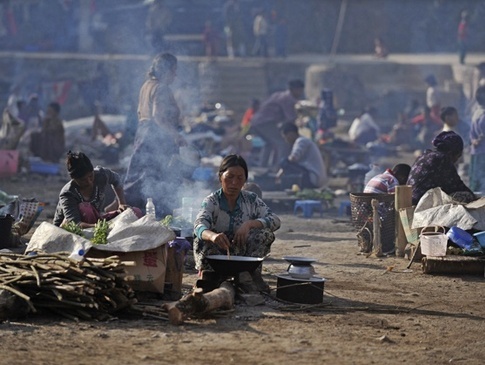After fleeing from the violence at the frontlines of Kachin state’s civil war, local citizens displaced along the Chinese border are finding themselves challenged to meet even basic standards of living.
The government continues to deny all INGOs access to the region and allows them to send only the smallest amount of aid.
A study released on Tuesday by the Kachin Women’s Association of Thailand reported, “international aid agencies, including the UN, have provided only 4 percent of basic food needs [to] this displaced population.”
Of the estimated 100,000 internally displaced people (IDP) in the region, about 60,000 have crossed into the camps and areas controlled by the Kachin Independence Army (KIA) near the border. Since the conflict began in June 2011, the Tatmadaw has routinely been accused of human rights violations against the local residents, including torture and forced labour.
“The IDPs are afraid of the army…They live under the KIA’s protection, they feel like the [KIA] are their parents” said an elder with the Kachin Baptist Association in Myitkyina.
The study goes on to detail how the lack of food and increasing number of IDPs in the camps under KIA control has placed a heavy burden on local communities and organisations. While many smaller aid groups have stepped up to help fill this void, their resources are often not enough to handle the needs of so many people.
In addition to food shortages, aid workers familiar with the situation have also cited the shortage of shelter and public toilets as a pressing issue in the camps. Janu, a representative from the Myitkyina-based NGO Metta, described visiting an IDP camp and seeing sleeping quarters constructed from plastic and bamboo.
“They need [proper] shelter, they need many things,” said Janu.
One camp near the Kachin Independence Organisation’s headquarters in Laiza is home to about 7,000 IDPs sharing only a handful of public bathrooms and a small supply of clean water. According to sources with the Kachin Baptist Convention (KBC) who declined to be identified, many of the people are forced to use contaminated water for their cooking and cleaning, which has led to an outbreak of skin diseases and stomach parasites.
Attempts to provide education to the many thousands of children in the camps also run into the familiar problems of large demand and little resources. In one of the IDP camps near Maijayang, the KBC sent in a group of volunteer teachers. In the estimation of one of the coordinators, there were ten teachers for the more than 1,000 children in the camp.
Min Zai, a coordinator with the Rangoon-based Shalom foundation, pointed out that mental health among the IDPs needed just as much attention as physical health.
“Some people in the camps are always thinking of the past,” said Min Zai. “They always think about the terrible experiences they have had.”
Min Zai went on to say that bleak living conditions could contribute to declining mental health.
“They have nothing in their hands, that will make them frustrated, that will make them want to give up.”



